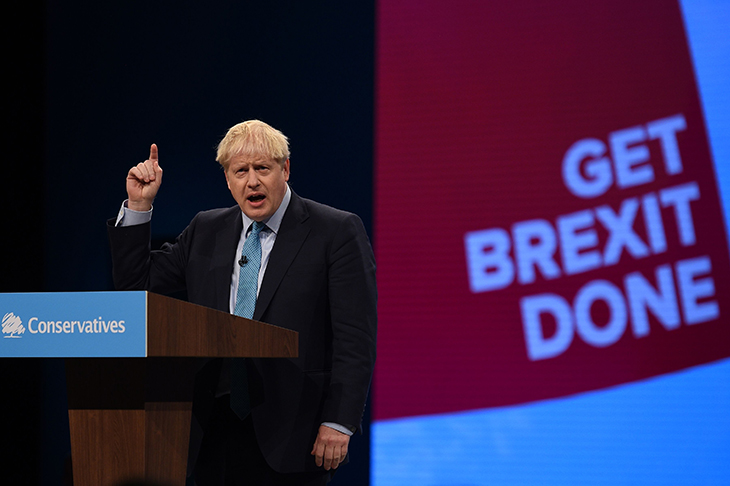‘It is definitely less than 50 percent,’ says one Downing Street source when asked about the chances of a Brexit deal. And this is one of the optimists. One cabinet minister warns that the UK ‘is driving into a brick wall’ with its current Brexit proposals; other ministers are not sure if this offer is designed to make a deal or just to make the point that London was prepared to compromise but Brussels refused to budge.
So it’s a stand-off. Boris Johnson is determined to take the whole of the UK out of the customs union, and the Irish and the EU are equally robust in their view that there can’t be checks on the island of Ireland. It’s plain that there isn’t going to be a deal any time soon, and there might not be many more negotiations either. No. 10 is clear that it isn’t interested in Potemkin talks. It only wants to do them if there is a genuine chance of a deal.
The odds are that negotiations will have broken down before the EU Council in mid-October. The Benn Act legally obliges the UK government to seek an extension on October 19 if no agreement with the EU has been reached. Downing Street, though, is adamant that it won’t be requesting an extension — but neither will the prime minister disobey the law. Those close to him are clear that he won’t resign either. He doesn’t want to give up the job and thinks voters wouldn’t thank him for letting Jeremy Corbyn in.
No. 10 is frantically looking for loopholes in the Benn Act, a plausible way to avoid sending the letter which isn’t simply breaking the law. They know that whatever the legal justification for their actions, they’ll be challenged in court — and will probably lose. Indeed, the Supreme Court appeared to anticipate a challenge to the Benn Act when, in its decision that prorogation was unlawful, it warned that the executive cannot render a ‘statute nugatory through recourse to the prerogative’.
So if any escape plan is doomed, why bother? The answer is that No. 10 thinks it needs to try, so as to be seen to be doing every-thing in its power to keep its promise of leaving by October 31. To give up now and admit defeat would be to break faith with voters. If the prime minister is forced to write a letter by parliament and by the judges (so the argument goes), Leave-supporting voters will blame them, not him. Other options are being assessed: for example, playing with the wording of the letter. A senior Downing Street source predicts that when the letter arrives, the EU will need to send for its lawyers to understand the implications of what the UK government is saying. But the EU is likely to grant an extension anyway — and see if an election changes anything. Even if the EU is becoming less keen on the UK staying in, it would still prefer to avoid no deal.
The opposition is convinced that if the UK doesn’t leave the EU on October 31, the air will come out of the Boris balloon. They think that Leave voters will lose faith in him and run to the Brexit party, blocking any Tory route to victory. In No. 10, though, there is increasing confidence that Leave voters would be more forgiving. As one senior figure puts it: ‘The voters will see one man trying to get it done and a bunch of arseholes trying to stop him.’
Corbyn has repeatedly said that once the extension is secured, he will agree to a general election. But Labour MPs aren’t keen on an election in the middle of winter, or before Brexit is resolved. They think the Lib Dems would split their vote, in the same way as they hope the Brexit party would split the Tory vote. Having been taken by surprise by Labour’s initial refusal to back an election, No. 10 is now wondering whether the opposition will try to keep parliament going until Brexit is resolved — perhaps with a caretaker prime minister.
It is hard, if not impossible, to see how that could happen. There is no agreement on the opposition benches about who the caretaker should be. Or how a caretaker government would pass a Budget or govern, given that the only thing there is a majority for in this House of Commons is delay. There definitely wouldn’t be a majority to simply revoke Article 50 and abandon the Brexit project. To date, there has been no majority for a second referendum either. So an election is coming: the only question is when.
The Tory conference showcased the party’s new message: that Boris Johnson is the leader trying to deliver Brexit, break the deadlock and move the country on. At the same time, Johnson will warn of the threat that Corbyn poses to everything from private property to the military. There’s quiet relief in Downing Street about the skepticism with which the public has greeted Labour’s plans for a four-day week. No. 10 thinks this is a sign that the public are less likely to be attracted to Labour’s policy prospectus than they were in 2017.
One of the worries for the Tories is that it is easier to be certain about where they’ll lose seats — Scotland, south-west London and commuter towns — than about where they will gain them. Senior Conservatives admit the political situation is so fluid that they have not yet determined which seats to target. But with parliament not yet prepared to allow an election, they have time to remedy this. Get ready for the most consequential general election in a generation.
This article was originally published in The Spectator’s UK magazine. Subscribe to the US edition here.



















